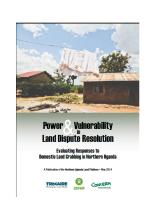/ library resources
Showing items 1 through 9 of 12.This article examines the evolution of policy recommendations concerning rural land issues since the formulation of the World Bank’s “Land Reform Policy Paper” in 1975.
Across the developing world, rural women suffer widespread gender-based discrimination in laws, customs and practices cause severe inequalities in their ability to access, control, own and use land and limit their participation in decision-making at all levels of land governance.
The Karamoja region in Northeastern Uganda, covering an area of 27,200 square kilometers, is inhabited by around 1.2 million people who live in seven districts; Moroto, Nakapiripirit, Napak, Amudat, Abim, Kotido and Kaabong.
The colonial and postcolonial legacy of the “Lost Counties” land issue has recently resurfaced as a contentious ethno-political issue in Uganda.
Uganda discovered commercial quantities of oil in the country in 2006 and ever since, there has been increased activity in the exploration of oil and gas.
This report is in relation to a study on the Land Tenure and Livelihood Issues in the Albertine Graben Region. The study was carried out in three districts of Amuru Buliisa and Hoima. The study specifically focused on tenurial arrangements and land transactions in the region.
The Uganda Law Reform Commission with support from the Justice Law and Order Sector undertook a study to review the laws of succession in Uganda. The purpose of the study was to ensure among others that; the provisions of the laws of succession are in conformity with the 1995 Constitu
Unfolding analysis reveals two types of land disputes prevalent in postwar northern Uganda: cases that involve a legitimate cause of action and those that do not.1 Since mediation and alternative forms of dispute resolution rely on parties’ willingness to negotiate in good faith, cases featuring
Uganda’s northern region was traditionally inhabited by communities with predominantly pastoral lifestyles. As the country began developing administrative structures in the region, most clans found themselves settled into agro-pastoral communities.
Pagination
Land Library Search
Through our robust search engine, you can search for any item of the over 73,000 highly curated resources in the Land Library.
If you would like to find an overview of what is possible, feel free to peruse the Search Guide.








